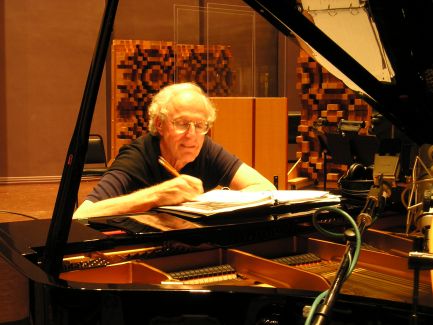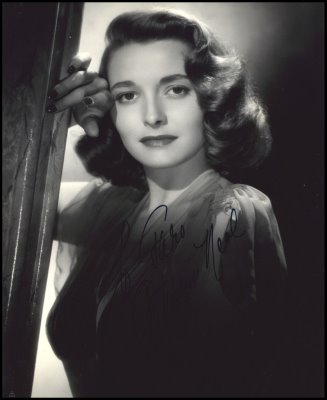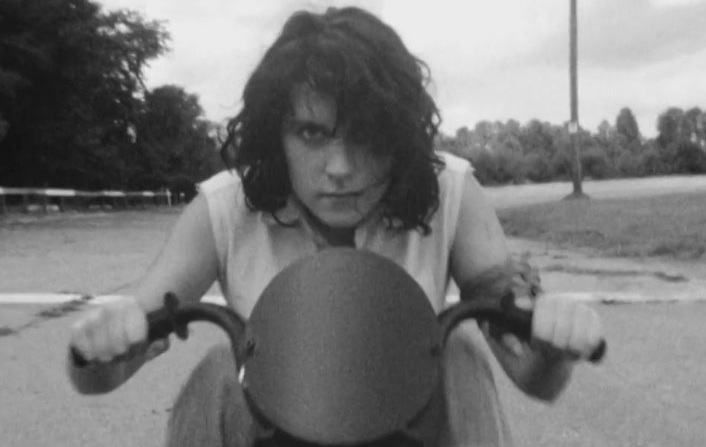Anybody who has ever been to a high school reunion (and I’ve been to my share) will tell you that the calendar and the clock can be incredibly cruel (particularly when combined with the long-term effects of gravity, but let’s not go there).
Time punishes creative works as well. Some work grows dated, stale, stiff. Time and the evolving form of the given art leaves a once vibrant and exciting work behind looking dead and obsolete.
More cruel, perhaps, is work that is simply…forgotten. Not for any good reason. Good as it was, maybe it was simply not successful enough to lodge very deeply in the popular consciousness; working well enough in its day, but soon lost among the ever-growing detritus of a lot of other pieces of yesterday.
Movie music is particularly vulnerable to the cruelties of time. Outside of the form’s devotees, it rarely makes much of an impression with the general public at all. Beyond John Williams or – in his day – Henry Mancini, it’s hard to think of a film composer whose name ever meant much to the average moviegoer. They might even be able to whistle the “Colonel Bogey March” from The Bridge on the River Kwai (1957), la-daaaaa la-da-da-daaaaaa their way through the theme from The Magnificent Seven (1960), but mention the names Elmer Bernstein or Malcolm Arnold (who adopted the 1914 march for Kwai) and you’re likely to get a blank stare.
But even those of us who consider ourselves students of The Cinema, well, we’re not always the discerning gourmets we like to think we are. We forget, too. We remember the greats for their great work which, in turn, is what makes the greats great. But we often forget the work they did – sometimes dues-paying work, sometimes part of their creative evolution – on their way to greatness (quick: how many of you know Elmer Bernstein scored Robot Monster [1953], maybe the only movie that can give Plan 9 from Outer Space [1959] a run for the money as worst movie of all time?).
Here’s four scores by four top-of-the-line movie music kings that most of us probably don’t remember…but should.

Seven Days in May (1964). Music by Jerry Goldsmith.
Until John Williams bombasted his way to the top of the heap, Goldsmith (1929-2004) was the the gold standard. He began writing music for radio dramas in the 1950s, crossed over to TV before the decade was out, and became a recognized name in the movie industry with his melancholic, rustic score for the contemporary Western Lonely are the Brave (1962). He quickly became a go-to composer for A-features and was particularly recognized for demonstrating – in atonal, avant garde-styled scores for Freud (1962), Planet of the Apes (1968), and Alien (1979) — that a good movie score didn’t particularly have to be hummable.
One of Goldsmith’s hallmarks was his restraint. Even in his lush scores for The Blue Max (1966) and Patton (1970), Goldsmith reined in his brass, let his strings flex their muscle, holding his horns in reserve to take heightening emotion that one last step to the peak.
He could also find the gold in the mournful wailing of a single, lonely trumpet, a signature he used to great effect in Lonely are the Brave, and even better in one of his best scores: Chinatown (1974, composed in just 10 days to replace a pre-existing score and rated #9 on the American Film Institute’s list of Top 25 film scores).
Goldsmith also knew when to shut up. The first half-hour or so of medical thriller Coma (1978) has no music at all, Goldsmith only stepping up when the movie moves from its more naturalistic first act deeper into its mystery plot.
But nowhere did Goldsmith exercise as tight a discipline – or as innovative a concept – as he did in his score for John Frankenheimer’s 1964 political thriller, Seven Days in May. There are less than eight minutes of music in the 118 minute movie. Goldsmith trusted what was on the screen, saw the strength in Frankenheimer’s clean black-and-white visuals, in the gallery of strong performances led by Kirk Douglas and Burt Lancaster, in the literate, compelling script by Rod Serling.
For a movie about a planned military coup to take over the government of the U.S., Goldsmith found the movie’s sound in a score composed completely for percussion. The movie’s main theme is simply a series of building drums beating out the same, unstoppable march, building to a crescendo topped off by metallic-sounding xylophone strikes.
It’s a tight, minimalist, militaristic, surprisingly powerful score, and like the best movie scores, a perfect fit.

None but the Brave (1965). Music by John Williams.
Today, he’s one of the most recognized, financially successful, and awarded movie music-makers on the planet. But, in the 1950s, John Williams (b. 1932) was working as an orchestrator and pianist for other movie composers (including his good friend, Jerry Goldsmith). That’s Williams you hear pounding out that pulsating piano rhythm for Henry Mancini’s iconic TV theme for Peter Gunn. By the 1960s, he’d become producer Irwin Allen’s go-to guy for a slew of energetic, sci fi juvenilia i.e. Lost in Space, The Time Tunnel, and Land of the Giants. Allen liked Williams pushy, brass-heavy scores enough that when the producer stepped up to be the Master of Disaster with big screen FX-fests like The Poseidon Adventure (1972) and The Towering Inferno (1974), he took Williams with him.
But undoubtedly one of the biggest catalysts in Williams’ career was when Steven Spielberg tapped him to score his 1974 thriller/drama, The Sugarland Express. Express didn’t light up the box office, but Spielberg had found a creative partner and took Williams with him to his next project: Jaws (1975). The movie’s two-note leitmotif was an instant classic and Spielberg hasn’t made a movie without Williams since. When George Lucas was putting together Star Wars (1977), Spielberg recommended Williams to his friend and another iconic collaboration was born.
Since then, Williams has composed almost exclusively for big-budget flicks which provide a perfect growth culture for his penchant for neoromantic fullness. Whereas Goldsmith tended to hold his brass back, Williams often leads with it, lets it carry the day, starting strong and ending stronger. Williams has done so many of this epic-sounding scores, it’s hard to remember – if remembered at all – that he has other colors.
One of Williams’ earliest feature scores – and, I think, one of his best – was for the 1965 WW II film None but the Brave, remembered by trivia nuts as the one film directed by Frank Sinatra. The movie concerns a plane-load of Marines who crashland on a long-bypassed island still occupied by a small unit of Japanese soldiers. It’s an impassioned, if pedantic, anti-war plea as the two groups of antagonists slowly learn to co-exist on the island, but ultimately are compelled by duty to engage in a final, pointless fight.
Sinatra was much better on-camera or crooning into a microphone than he was in the director’s seat, and the movie emerges as an earnest, watchable, but not overly memorable effort.
But Williams’ score beautifully captures the spirit of the film, its well-intended grasping for that grand idea synopsized by the movie’s closing shot of the island and the superimposed line: “Nobody ever wins.”
Unlike Williams’ later, brass-heavy works, the opening theme – after an initial, announcing single horn – is driven by a Goldsmithesque swelling of strings which continue to carry the score. Even better are the melancholy closing minutes: the strings, now gentle, and a single, sad trumpet commemorate the wasted dead. As the few surviving Americans await a rescue pick-up on the beach, the voice of the dead Japanese commander (Tatsuya Mihashi) – his prescient words those of a manuscript written to his wife, now carried by American commander Clint Walker – intones, over Williams’ beautifully understated but mournful music, that “There is no death where the spirit lives. So this was just another day, and I say to you good night.”
Few of the films Williams has worked on over the last 30 years have given him the opportunity to so deftly capture the sense of loss, of tragic waste, of aspiration toward something better granted him by None but the Brave.

The Taking of Pelham One Two Three (1974). Music by David Shire.
Shire (b. 1937) may not have the name recognition of John Williams or Jerry Goldsmith, but in a career spanning more than five decades, he’s amassed of body of impressive and respected work. His earliest professional compositions were collaborations with lyricist Richard Maltby on stage musicals (he continues to go back to the stage regularly and has been nominated for the Tony several times for his Broadway work). Within a few years, he was composing scores for TV and by the 1970s he was working on big screen projects as well.
His range is dazzling: from the original music for the movie that kicked off the disco craze, Saturday Night Fever (1977), to David Fincher’s dark, disturbing true-life thriller, Zodiac (2007).
But of all his work, perhaps most distinctive is his score for the original The Taking of Pelham One Two Three (1974). While the film about the hijacking of a New York subway train, in time, would become one of the more memorable thrillers of the 1970s, it was a flop in its day, but no one who saw the movie could forget Shire’s pounding, pumping main theme. With an urban jazz-funk beat, a rolling rhythm that caught the metal-on-metal movement of a train, it’s a seamless melding of music and movie.
For all that, it’s a restrained score, intruding rarely. But when it’s there, it juices a non-stop thriller into hyper drive, as it does during a frantic money-counting sequence driven largely by a frantic piano.
Once you listen to Shire’s main theme, Harry Gregson-Williams’ score for Tony Scott’s 2009 remake seems all the more characterless and as detached from the gritty heart of the Big Apple as its host film. Shire’s music, on the other hand, is as New York as, well, “New York, New York” – so much so that it was adapted as the unofficial theme of the New York subway system’s #6 line (the line supposedly shown in the movie).

Marathon Man (1976). Music by Michael Small.
Ironically, Small (1939-2003) did his most memorable work…small. His signature scores are wonderfully atmospheric yet thinly orchestrated. There’s almost something Brian Eno-esque about his best work, and Marathon Man is no exception.
Small’s career began doing background music for New York stage productions. But when film producer Edward Pressman heard his work and asked him to score the teen pic Out of It (1969), Small made the jump to the big screen.
Like any film composer worth his or her salt, Small was wonderfully versatile. Bob Rafelson would hire him for his broody 1981 remake of the classic noir, The Postman Always Rings Twice, as well as for his capacity for more expansive, soaring work for the period adventure, Mountains of the Moon (1990).
But his trademark scores were his low-key, moody compositions for thrillers like Klute (1971), The Parallax View (1974), and The Star Chamber (1983). His best: Marathon Man (1976).
Dustin Hoffman is a Columbia grad student dragged into a shadowy underworld of fugitive Nazis and government dirty goings-on through the murder of his brother. The big villain, played by Laurence Olivier in an Oscar-nominated role, had been a dentist in a wartime concentration camp, and Small shrewdly introduces, as a recurring motif, a drill-like trill into his score.
Small works more with mood than melody: a few well chosen low notes, the thin trickle of a piano, that whining, whirring trill, the low thrum of heavy strings. Dark, rain-slicked streets become darker, the whole film feels appropriately damp and melancholy, autumnal. Yet one of Small’s best moments is his more fluid, rising passage for a montage sequence tracing the romance between Hoffman and Marthe Keller – a romance which, like all of the relationships in the movie, is both tainted and doomed by its connection to malevolent forces of which Hoffman is, for the moment, ignorant.
As a thriller, Marathon Man was one of the best for its very human character; Hoffman is no superhero, the plot involves no super villains or grand master plans. All of its characters have a heft rarely seen in thrillers, and Small captures that gravitas, all those sad histories which seem to have fore-damned Marathon Man’s characters, and the loss which ultimately hangs over its one survivor.

Straw Dogs (1971). Music by Jerry Fielding.
Jerry Fielding (1922-1980) began as an arranger during the Big Band era of the 1930s and 1940s. His work with the Big Bands led to music jobs on radio which, in turn, led him to TV where he did the music for the Groucho Marx quiz show, You Bet Your Life. But headstrong and combative and, by his own admission, “a loudmouth,” Fielding fell afoul of the McCarthy era blacklist and was banned from film and TV until hardheaded producer/director Otto Preminger tapped Fielding for his first big screen assignment, scoring the 1962 political drama, Advise and Consent.
His blacklist status now broken, Fielding worked heavily in television for much of the 1960s, providing music for everything from the original Star Trek series to slapstick sitcom McHale’s Navy to thriller Mission: Impossible. His biggest break came in 1969 with his acclaimed and rousing score for Sam Peckinpah’s classic Western, The Wild Bunch.
Fielding became Peckinpah’s go-to guy and he would compose three more scores for the filmmaker. He would also establish long-running and fruitful relationships with Clint Eastwood and Michael Winner.
The Wild Bunch remains one of Peckinpah’s most-beloved films which is probably why Fielding’s other work for the director is not as well-remembered. I would argue that as good as his work on Bunch is, his more nuanced, more atmospheric work on Straw Dogs is even better.
Dustin Hoffman is an academic hiding from the social unrest of the time by removing himself to the Cornish countryside with trophy wife Susan George. But Hoffman can’t avoid strife and he finds himself on the wrong side of a vigilante mob during the film’s shattering climax.
Fielding’s score is a brooding piece of mellow, atonal horns and woodwinds, and subdued strings which capture the damp, lonely emptiness of the Cornish moors, and the pagan, barbaric feel of a place that’s never completely let the outside, modern world in. As pensive as The Wild Bunch was cathartic, as aimed at the intellect as Bunch was at the gut, Fielding’s score for Straw Dogs was one of his smartest, bravest pieces of work.
– Bill Mesce




